HILT Conference 2023: Speaker Bios
Teaching in the Age of AI: Nurturing Connections and Empowering Learners
Friday, September 22, 2023
Harvard Business School, Harvard University
Welcome Remarks and Introduction
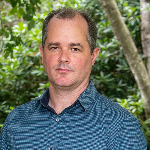 Dustin Tingley is a Professor of Government in the Government Department at Harvard University. He is also Deputy Vice Provost for Advances in Learning (Deputy VPAL), and directs the VPAL Research Group and the Harvard Initiative for Learning and Teaching (HILT). He received a PhD in Politics from Princeton and BA from the University of Rochester. His research interests include international relations, political economy, climate change, data science, and education.
Dustin Tingley is a Professor of Government in the Government Department at Harvard University. He is also Deputy Vice Provost for Advances in Learning (Deputy VPAL), and directs the VPAL Research Group and the Harvard Initiative for Learning and Teaching (HILT). He received a PhD in Politics from Princeton and BA from the University of Rochester. His research interests include international relations, political economy, climate change, data science, and education.
Framing Remarks: “Elevating Teaching and Learning through Generative AI.”
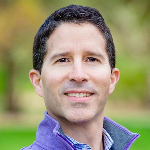 Mitchell B. Weiss is the Richard L. Menschel Professor of Management Practice at the Harvard Business School. He created and teaches the school’s course on Public Entrepreneurship. He is the faculty chair for the first year, required curriculum at HBS. Prior to joining HBS in 2014, Mitch was Chief of Staff and a partner to Boston’s Mayor Thomas Menino. Mitch helped shape New Urban Mechanics, Boston’s municipal innovation strategy, and make it a model for peer-produced government and change. He is the author of We the Possibility from Harvard Business Review Press (2021). Mitch has been named one of the 100 most influential academics in government.
Mitchell B. Weiss is the Richard L. Menschel Professor of Management Practice at the Harvard Business School. He created and teaches the school’s course on Public Entrepreneurship. He is the faculty chair for the first year, required curriculum at HBS. Prior to joining HBS in 2014, Mitch was Chief of Staff and a partner to Boston’s Mayor Thomas Menino. Mitch helped shape New Urban Mechanics, Boston’s municipal innovation strategy, and make it a model for peer-produced government and change. He is the author of We the Possibility from Harvard Business Review Press (2021). Mitch has been named one of the 100 most influential academics in government.
Morning Plenary: “Forecasting the Role of Generative AI on the Future of Higher Education”
 Kristina Ishmael is an educator, learner, advocate, and agent of change. As the leader of the Office of Ed Tech, she executes the office’s mission of developing national edtech policy that enables everywhere, all-the-time learning and supports digital equity and opportunity. In her nearly two-decade education career, Ishmael has worked at the federal, state, and school level, allowing her to develop a unique perspective on policy and practice and a vast network from whom she continues to learn and share. Most recently, she worked as an educational consultant and Sr. Research Fellow on New America’s Teaching, Learning, & Tech team, where she advised on the inclusive technology portfolio at the intersection of open education, digital equity, and culturally responsive and sustaining education. Ishmael’s impressive career in education also includes her work as the Digital Learning Specialist for the Nebraska Department of Education, where she led professional learning, developed policy, and advocated for school librarians. This experience granted her a unique perspective on leveraging educational technology in urban, suburban, and rural school systems. Before her state leadership role, Kristina started as an early childhood and elementary teacher of emerging bilingual students in Omaha, Nebraska. Kristina Ishmael has become a respected voice in the world of education and edtech and is a fierce advocate for equity and access to quality education for all learners.
Kristina Ishmael is an educator, learner, advocate, and agent of change. As the leader of the Office of Ed Tech, she executes the office’s mission of developing national edtech policy that enables everywhere, all-the-time learning and supports digital equity and opportunity. In her nearly two-decade education career, Ishmael has worked at the federal, state, and school level, allowing her to develop a unique perspective on policy and practice and a vast network from whom she continues to learn and share. Most recently, she worked as an educational consultant and Sr. Research Fellow on New America’s Teaching, Learning, & Tech team, where she advised on the inclusive technology portfolio at the intersection of open education, digital equity, and culturally responsive and sustaining education. Ishmael’s impressive career in education also includes her work as the Digital Learning Specialist for the Nebraska Department of Education, where she led professional learning, developed policy, and advocated for school librarians. This experience granted her a unique perspective on leveraging educational technology in urban, suburban, and rural school systems. Before her state leadership role, Kristina started as an early childhood and elementary teacher of emerging bilingual students in Omaha, Nebraska. Kristina Ishmael has become a respected voice in the world of education and edtech and is a fierce advocate for equity and access to quality education for all learners.
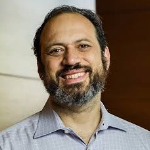 Ethan Mollick is an Associate Professor at the Wharton School of the University of Pennsylvania, where he studies and teaches innovation and entrepreneurship, and also examines the effects of artificial intelligence on work and education. He also leads Wharton Interactive, an effort to democratize education using games, simulations, and AI. His academic papers have been published in top management journals and his research has been covered by CNN, The New York Times, and other leading publications. He has created numerous teaching games on a wide variety of topics, including video games and board games. Prior to his time in academia, Ethan co-founded a startup company, and he currently advises a number of startups and organizations. Mollick received his PhD and MBA from MIT’s Sloan School of Management and his bachelor’s degree from Harvard University.
Ethan Mollick is an Associate Professor at the Wharton School of the University of Pennsylvania, where he studies and teaches innovation and entrepreneurship, and also examines the effects of artificial intelligence on work and education. He also leads Wharton Interactive, an effort to democratize education using games, simulations, and AI. His academic papers have been published in top management journals and his research has been covered by CNN, The New York Times, and other leading publications. He has created numerous teaching games on a wide variety of topics, including video games and board games. Prior to his time in academia, Ethan co-founded a startup company, and he currently advises a number of startups and organizations. Mollick received his PhD and MBA from MIT’s Sloan School of Management and his bachelor’s degree from Harvard University.
 Jeffrey Schnapp is the founder/faculty director of metaLAB (at) Harvard and faculty co-director of the Berkman Klein Center for Internet and Society at Harvard University. He holds the Carl A. Pescosolido Chair in Romance Languages and Literatures and Comparative Literature in Harvard’s Faculty of Arts and Sciences (his principal appointment) but is also on the teaching faculty in the Department of Architecture at Harvard’s Graduate School of Design. He currently serves as Chair of the Department of Comparative Literature. Schnapp’s work in the domains of media, knowledge design, digital arts and humanities, and curatorial practice includes collaborations with the Triennale di Milano, the Cantor Center for the Visual Arts, the Wolfsonian-FIU, the Museo Madre e Fondazione Donnaregina (Naples), and the Canadian Center for Architecture. Jeffrey Schnapp has spoken on some of the world’s most prestigious stages: TED, DLD, the United Nations, World Frontiers Forum, the Royal Academy of Sweden, the Global Leaders Forum, Bibliothèque Nationale de France, Volkswagenstiftung, SXSW, Festivalfilosofia, Lezioni di storia (Laterza), Fondazione Corriere della Sera, MEET, and the US National Archives.
Jeffrey Schnapp is the founder/faculty director of metaLAB (at) Harvard and faculty co-director of the Berkman Klein Center for Internet and Society at Harvard University. He holds the Carl A. Pescosolido Chair in Romance Languages and Literatures and Comparative Literature in Harvard’s Faculty of Arts and Sciences (his principal appointment) but is also on the teaching faculty in the Department of Architecture at Harvard’s Graduate School of Design. He currently serves as Chair of the Department of Comparative Literature. Schnapp’s work in the domains of media, knowledge design, digital arts and humanities, and curatorial practice includes collaborations with the Triennale di Milano, the Cantor Center for the Visual Arts, the Wolfsonian-FIU, the Museo Madre e Fondazione Donnaregina (Naples), and the Canadian Center for Architecture. Jeffrey Schnapp has spoken on some of the world’s most prestigious stages: TED, DLD, the United Nations, World Frontiers Forum, the Royal Academy of Sweden, the Global Leaders Forum, Bibliothèque Nationale de France, Volkswagenstiftung, SXSW, Festivalfilosofia, Lezioni di storia (Laterza), Fondazione Corriere della Sera, MEET, and the US National Archives.
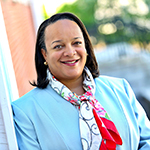 Bridget Terry Long is Dean and Saris Professor of Education and Economics at the Harvard Graduate School of Education. A member of the HGSE faculty since 2000, Long served as academic dean from 2013 to 2017 and was previously the faculty director of the Ed.D. and Ph.D. programs from 2010 to 2013. Long is an economist who focuses on the transition from high school to higher education and beyond. Her research examines the impact of factors such as affordability and academic preparation on college student outcomes. Long is a research associate of the National Bureau of Economic Research (NBER) and a member of the National Academy of Education. She is also a Fellow of the International Academy of Education (IAE). Long was appointed to the National Board for Education Sciences (NBES), the advisory panel of the Institute of Education Sciences (IES) at the U.S. Department of Education, and she served as Vice Chair and then Chair during her appointment. She has also testified multiple times before Federal Congressional Committees and state government bodies, and she has been a Visiting Fellow at the Federal Reserve Bank of Boston.
Bridget Terry Long is Dean and Saris Professor of Education and Economics at the Harvard Graduate School of Education. A member of the HGSE faculty since 2000, Long served as academic dean from 2013 to 2017 and was previously the faculty director of the Ed.D. and Ph.D. programs from 2010 to 2013. Long is an economist who focuses on the transition from high school to higher education and beyond. Her research examines the impact of factors such as affordability and academic preparation on college student outcomes. Long is a research associate of the National Bureau of Economic Research (NBER) and a member of the National Academy of Education. She is also a Fellow of the International Academy of Education (IAE). Long was appointed to the National Board for Education Sciences (NBES), the advisory panel of the Institute of Education Sciences (IES) at the U.S. Department of Education, and she served as Vice Chair and then Chair during her appointment. She has also testified multiple times before Federal Congressional Committees and state government bodies, and she has been a Visiting Fellow at the Federal Reserve Bank of Boston.
Concurrent Breakout Sessions
“Harvard Generative AI Tools: Demo and Discussion”
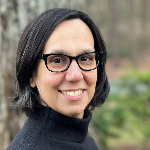 Emily Bottis is the Managing Director of Academic Technology at HUIT. In this role, she oversees the University-wide and FAS portfolio of teaching and learning technologies and related service and software development teams that ensure technology is used to its fullest potential. Emily also leads the development and design of the Learning Experience Platform (LXP), a custom-built learning platform designed to meet Harvard’s diverse pedagogical needs. A graduate of Brown University, Emily has centered her career on custom software development with a special focus on the creative use of technology to solve novel problems. Her experience includes building the subsidized childcare system for the state of Massachusetts, citizen science projects, user-generated museum exhibits, and online learning platforms. Before joining Harvard, Emily served as the Director of Interactive and Information Technology at the Museum of Science, Director of User Experience at Harvard Business School Online, and Director of Product Management at Extension Engine. An active technology maker, Emily’s work includes grant-funded community-based interactive experiences and award-winning applications.
Emily Bottis is the Managing Director of Academic Technology at HUIT. In this role, she oversees the University-wide and FAS portfolio of teaching and learning technologies and related service and software development teams that ensure technology is used to its fullest potential. Emily also leads the development and design of the Learning Experience Platform (LXP), a custom-built learning platform designed to meet Harvard’s diverse pedagogical needs. A graduate of Brown University, Emily has centered her career on custom software development with a special focus on the creative use of technology to solve novel problems. Her experience includes building the subsidized childcare system for the state of Massachusetts, citizen science projects, user-generated museum exhibits, and online learning platforms. Before joining Harvard, Emily served as the Director of Interactive and Information Technology at the Museum of Science, Director of User Experience at Harvard Business School Online, and Director of Product Management at Extension Engine. An active technology maker, Emily’s work includes grant-funded community-based interactive experiences and award-winning applications.
 Mitchell B. Weiss is the Richard L. Menschel Professor of Management Practice at the Harvard Business School. He created and teaches the school’s course on Public Entrepreneurship. He is the faculty chair for the first year, required curriculum at HBS. Prior to joining HBS in 2014, Mitch was Chief of Staff and a partner to Boston’s Mayor Thomas Menino. Mitch helped shape New Urban Mechanics, Boston’s municipal innovation strategy, and make it a model for peer-produced government and change. He is the author of We the Possibility from Harvard Business Review Press (2021). Mitch has been named one of the 100 most influential academics in government.
Mitchell B. Weiss is the Richard L. Menschel Professor of Management Practice at the Harvard Business School. He created and teaches the school’s course on Public Entrepreneurship. He is the faculty chair for the first year, required curriculum at HBS. Prior to joining HBS in 2014, Mitch was Chief of Staff and a partner to Boston’s Mayor Thomas Menino. Mitch helped shape New Urban Mechanics, Boston’s municipal innovation strategy, and make it a model for peer-produced government and change. He is the author of We the Possibility from Harvard Business Review Press (2021). Mitch has been named one of the 100 most influential academics in government.

Sebastian Schmidt Dalzon is the Assistant Dean for Academic and Strategic Planning at HGSD. Sebastian is an urban and architectural historian focusing on issues of war, race, and memory in the United States, Germany, and Japan in the 20th and 21st centuries. He holds a Ph.D. in the History and Theory of Architecture (MIT), an MSc in Urban Studies (The University of Edinburgh), and a BA in Cultural Studies (Heinrich-Heine-Universität Düsseldorf). With a guiding interest in global and antihegemonic historiography, Sebastian’s work uses interdisciplinary approaches to investigate the urban environment as a meeting place of ideological, economic, and governmental powers, paying special attention to the social construction of narratives around ethnicity, race, and gender. As assistant dean for academic and strategic planning, Sebastian oversees curriculum planning, academic technology, institutional research, teaching and learning policies, and special projects.
“Leveraging Artificial Intelligence in Assessments: Opportunities and Challenges”
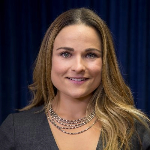 Erin Baumann is the Senior Associate Director of Professional Pedagogy and leads the SLATE Pedagogy Team. In this role, she oversees SLATE’s work in instructional support, pedagogical research, and faculty programming. Erin’s work brings together elements of educational development, assessment, and instructional design to support faculty and programs in course design, curriculum development, learning assessment, classroom management, and pedagogical innovation. Erin also leads SLATE’s experiential learning and simulation development practice, which has developed, evaluated, and supported the facilitation of over 30 simulations, games, and field-based learning experiences at HKS. In addition to her work at HKS, Erin is an Adjunct Lecturer in International Relations and Politics at Woods College of Advancing Studies at Boston College and a Non-Resident Fellow with the Dublin European Institute. Prior to joining HKS, Erin was a Lecturer in International Relations and Comparative Politics in the School of Politics and International Relations (SPIRe) at University College Dublin (UCD). Erin has also held positions with the Government of Ireland, National University of Kyiv-Mohyla Academy (Kyiv, Ukraine), Belarusian State University (Minsk, Belarus), Calpine Corporation, and the US House of Representatives. Erin has a Ph.D. and an M.Sc. in International Relations from University College Dublin, and a B.A. in International Affairs and History from the Elliott School of International Affairs The George Washington University.
Erin Baumann is the Senior Associate Director of Professional Pedagogy and leads the SLATE Pedagogy Team. In this role, she oversees SLATE’s work in instructional support, pedagogical research, and faculty programming. Erin’s work brings together elements of educational development, assessment, and instructional design to support faculty and programs in course design, curriculum development, learning assessment, classroom management, and pedagogical innovation. Erin also leads SLATE’s experiential learning and simulation development practice, which has developed, evaluated, and supported the facilitation of over 30 simulations, games, and field-based learning experiences at HKS. In addition to her work at HKS, Erin is an Adjunct Lecturer in International Relations and Politics at Woods College of Advancing Studies at Boston College and a Non-Resident Fellow with the Dublin European Institute. Prior to joining HKS, Erin was a Lecturer in International Relations and Comparative Politics in the School of Politics and International Relations (SPIRe) at University College Dublin (UCD). Erin has also held positions with the Government of Ireland, National University of Kyiv-Mohyla Academy (Kyiv, Ukraine), Belarusian State University (Minsk, Belarus), Calpine Corporation, and the US House of Representatives. Erin has a Ph.D. and an M.Sc. in International Relations from University College Dublin, and a B.A. in International Affairs and History from the Elliott School of International Affairs The George Washington University.
 Louis Deslauriers is the Director of Science Teaching and Learning in the Faculty of Arts and Sciences and a Senior Preceptor in Physics at Harvard University. In this role, he mentors instructors in the adoption of research-based pedagogical approaches, develops psychometric methods to assess instructional effectiveness, and devises teaching techniques designed to optimize learning outcomes. Louis also teaches the introductory physics sequence and quantum mechanics. His research includes a significant focus on deliberate practice, applied to increase the effectiveness of active learning inside and outside the classroom. A noteworthy paper on this subject was published in Science, titled ‘Improved Learning in a Large-Enrollment Physics Class.’ This research-based active learning technique has been widely adopted across North American universities, as it allows for significant learning gains without sacrificing content coverage. In addition to focusing on deliberate practice, his work extends into the cognitive psychology of learning, notably exploring the disconnect between students’ perception of learning and actual learning, as highlighted in a paper published in PNAS ‘Measuring Actual Learning versus Feeling of Learning in Response to being Actively Engaged in the Classroom’. These findings raise concerns over using perception alone for course evaluation in STEM education. Originally from Quebec, Canada, Louis earned his Ph.D. in Physics from the University of Michigan.
Louis Deslauriers is the Director of Science Teaching and Learning in the Faculty of Arts and Sciences and a Senior Preceptor in Physics at Harvard University. In this role, he mentors instructors in the adoption of research-based pedagogical approaches, develops psychometric methods to assess instructional effectiveness, and devises teaching techniques designed to optimize learning outcomes. Louis also teaches the introductory physics sequence and quantum mechanics. His research includes a significant focus on deliberate practice, applied to increase the effectiveness of active learning inside and outside the classroom. A noteworthy paper on this subject was published in Science, titled ‘Improved Learning in a Large-Enrollment Physics Class.’ This research-based active learning technique has been widely adopted across North American universities, as it allows for significant learning gains without sacrificing content coverage. In addition to focusing on deliberate practice, his work extends into the cognitive psychology of learning, notably exploring the disconnect between students’ perception of learning and actual learning, as highlighted in a paper published in PNAS ‘Measuring Actual Learning versus Feeling of Learning in Response to being Actively Engaged in the Classroom’. These findings raise concerns over using perception alone for course evaluation in STEM education. Originally from Quebec, Canada, Louis earned his Ph.D. in Physics from the University of Michigan.
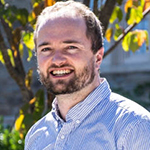 John FitzGibbon is the Associate Director for Digital Learning Innovation in CDIL at Boston College. His role is to explore the use of digital tools to enhance teaching and learning practice in both online and face to face courses at BC. In addition he manages the FD&I team to support BC faculty in all aspects of their teaching – from getting their online courses ready for the new semester, facilitating training programs in course design, course development, and teaching online. His work focuses on providing BC faculty with a collaborative partnership to explore the potentials of digital technologies for teaching and learning. Recent projects include developing Augmented Reality experiences for students; virtual field trips; 360 degree video experiences of Mexican historical sites; and interactive branching scenarios. He is also an adjunct faculty member at the Woods College of Advancing Studies and BC’s Department of Political Science where he teaches face to face, hybrid, and online courses in Comparative Politics, International Political Economy, and Populism. His research focuses on Euroscepticism, Populism, Social Movements, and the use of Simulations in Political Science Education. He has published several articles, book chapters, and a co-edited volume. Prior to joining BC John was an Associate Professor in Political Science at Canterbury Christ Church University in the United Kingdom. There he taught courses in European Political Economy, European Union Politics, US Politics, Social Science Research Methods, and Comparative Politics. He has also taught at the National University of Ireland, Maynooth, University of Sussex, and the University of Dundee. John completed his DPhil in Comparative European Politics at the University of Sussex, he holds an MSc in Social Science Research Methods from the University of Sussex, and a BA in History and Politics from the University of Limerick.
John FitzGibbon is the Associate Director for Digital Learning Innovation in CDIL at Boston College. His role is to explore the use of digital tools to enhance teaching and learning practice in both online and face to face courses at BC. In addition he manages the FD&I team to support BC faculty in all aspects of their teaching – from getting their online courses ready for the new semester, facilitating training programs in course design, course development, and teaching online. His work focuses on providing BC faculty with a collaborative partnership to explore the potentials of digital technologies for teaching and learning. Recent projects include developing Augmented Reality experiences for students; virtual field trips; 360 degree video experiences of Mexican historical sites; and interactive branching scenarios. He is also an adjunct faculty member at the Woods College of Advancing Studies and BC’s Department of Political Science where he teaches face to face, hybrid, and online courses in Comparative Politics, International Political Economy, and Populism. His research focuses on Euroscepticism, Populism, Social Movements, and the use of Simulations in Political Science Education. He has published several articles, book chapters, and a co-edited volume. Prior to joining BC John was an Associate Professor in Political Science at Canterbury Christ Church University in the United Kingdom. There he taught courses in European Political Economy, European Union Politics, US Politics, Social Science Research Methods, and Comparative Politics. He has also taught at the National University of Ireland, Maynooth, University of Sussex, and the University of Dundee. John completed his DPhil in Comparative European Politics at the University of Sussex, he holds an MSc in Social Science Research Methods from the University of Sussex, and a BA in History and Politics from the University of Limerick.
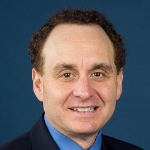 Dan Levy is a Senior Lecturer in Public Policy at the Harvard Kennedy School (HKS) who teaches courses in quantitative methods, policy analysis, and program evaluation. His research focuses on evaluating the impact of social programs, including health programs in Indonesia and Tanzania, and education programs in Burkina Faso and Niger. He currently serves as the faculty director of the Public Leadership Credential, the Harvard Kennedy School’s flagship online learning initiative. He co-founded Teachly, a web application aimed at helping faculty members to teach more effectively and more inclusively. He authored the book “Teaching Effectively with Zoom: A practical guide to engage your students and help them learn” and the book “Maxims for Thinking Analytically: The wisdom of legendary Harvard Professor Richard Zeckhauser” His teaching was featured in “Invisible Learning” a book written by David Franklin. He received his PhD in Economics from Northwestern University, grew up in Venezuela, and is fluent in Spanish and French.
Dan Levy is a Senior Lecturer in Public Policy at the Harvard Kennedy School (HKS) who teaches courses in quantitative methods, policy analysis, and program evaluation. His research focuses on evaluating the impact of social programs, including health programs in Indonesia and Tanzania, and education programs in Burkina Faso and Niger. He currently serves as the faculty director of the Public Leadership Credential, the Harvard Kennedy School’s flagship online learning initiative. He co-founded Teachly, a web application aimed at helping faculty members to teach more effectively and more inclusively. He authored the book “Teaching Effectively with Zoom: A practical guide to engage your students and help them learn” and the book “Maxims for Thinking Analytically: The wisdom of legendary Harvard Professor Richard Zeckhauser” His teaching was featured in “Invisible Learning” a book written by David Franklin. He received his PhD in Economics from Northwestern University, grew up in Venezuela, and is fluent in Spanish and French.
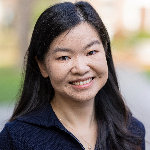 Xueying Prawat is a Curriculum and Assessment Specialist at the Harvard Graduate School of Education. In her role at the Teaching and Learning Lab at HGSE, Xueying supports curriculum development and works collaboratively on research and assessments of student learning and program impact offered by HGSE. Xueying’s passion lies in supporting quality postsecondary education for both students and educators. Prior to joining the TLL, she spent nearly a decade in both research and teaching in the education field. She currently holds a Ph.D. in Curriculum, Instruction, and Teacher Education from Michigan State University.
Xueying Prawat is a Curriculum and Assessment Specialist at the Harvard Graduate School of Education. In her role at the Teaching and Learning Lab at HGSE, Xueying supports curriculum development and works collaboratively on research and assessments of student learning and program impact offered by HGSE. Xueying’s passion lies in supporting quality postsecondary education for both students and educators. Prior to joining the TLL, she spent nearly a decade in both research and teaching in the education field. She currently holds a Ph.D. in Curriculum, Instruction, and Teacher Education from Michigan State University.
“Nurturing Human Connection in AI-Enhanced Learning Environments”
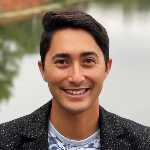 Gabe Abrams is a Principal Software Engineer and EdTech Innovator at the Harvard Division of Continuing Education (DCE). Gabe spends half of their time working with teaching and learning folks to identify new ways to improve DCE classes. Gabe spends the other half of their time building technologies, apps, and tools that set out to achieve those goals.
Gabe Abrams is a Principal Software Engineer and EdTech Innovator at the Harvard Division of Continuing Education (DCE). Gabe spends half of their time working with teaching and learning folks to identify new ways to improve DCE classes. Gabe spends the other half of their time building technologies, apps, and tools that set out to achieve those goals.
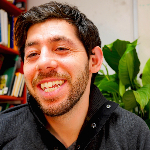 Greg Kestin is the Associate Director of Science Education and a Lecturer in the Physics Department at Harvard. There, he completed his Ph.D. in physics, focusing on theoretical physics and quantum field theory, as a member of The Center for the Fundamental Laws of Nature. He then joined the faculty of Harvard’s Physics Department as a College Fellow and Preceptor. Over his career he has conducted research in nuclear physics, particle physics, fusion energy, gravitational wave physics, and science education. As a Digital Producer at NOVA | PBS, he created award-winning media, from documentaries to educational interactives to an original video series, “What the Physics?!” In his time at NOVA |PBS, nearly a decade, he served as director, producer, screenwriter, scientific consultant, on-screen talent, author, grant writer, animator, public speaker, and more.
Greg Kestin is the Associate Director of Science Education and a Lecturer in the Physics Department at Harvard. There, he completed his Ph.D. in physics, focusing on theoretical physics and quantum field theory, as a member of The Center for the Fundamental Laws of Nature. He then joined the faculty of Harvard’s Physics Department as a College Fellow and Preceptor. Over his career he has conducted research in nuclear physics, particle physics, fusion energy, gravitational wave physics, and science education. As a Digital Producer at NOVA | PBS, he created award-winning media, from documentaries to educational interactives to an original video series, “What the Physics?!” In his time at NOVA |PBS, nearly a decade, he served as director, producer, screenwriter, scientific consultant, on-screen talent, author, grant writer, animator, public speaker, and more.
 Nicole Mills is the Joint Director of Language Programs in the Department of Romance Languages & Literatures and lecturer in the Graduate School of Education at Harvard University. She teaches courses in French, language pedagogy, and technology enhanced language learning and serves as the advisor for Harvard’s Bok Certificate in Teaching Languages and Cultures. Her research interests are associated with virtual and simulated environments in language learning, the psychology of language learning and teaching, and language program evaluation. Her book Perspectives on Teaching Language and Content (co-authored with Stacey Katz Bourns and Cheryl Krueger) was published in 2020 with Yale University Press and she has various publications in the Modern Language Journal, the Foreign Language Annals, Language Learning, the CALICO journal, the International Journal of Applied Linguistics and in various edited volumes. She holds a Ph.D. in Educational Studies and French from Emory University.
Nicole Mills is the Joint Director of Language Programs in the Department of Romance Languages & Literatures and lecturer in the Graduate School of Education at Harvard University. She teaches courses in French, language pedagogy, and technology enhanced language learning and serves as the advisor for Harvard’s Bok Certificate in Teaching Languages and Cultures. Her research interests are associated with virtual and simulated environments in language learning, the psychology of language learning and teaching, and language program evaluation. Her book Perspectives on Teaching Language and Content (co-authored with Stacey Katz Bourns and Cheryl Krueger) was published in 2020 with Yale University Press and she has various publications in the Modern Language Journal, the Foreign Language Annals, Language Learning, the CALICO journal, the International Journal of Applied Linguistics and in various edited volumes. She holds a Ph.D. in Educational Studies and French from Emory University.
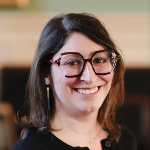 Adrienne Phelps-Coco is the executive director of teaching and learning at the Harvard Division of Continuing Education where she oversees the pedagogical and technical support for about 1,200 online, blended and HyFlex courses per year. Her areas of interest include finding scalable practices to support online learning that is both human and flexible and developing methods to help faculty build community across their in person, live online and asynchronous student groups. Adrienne holds a PhD in American history from the University of Illinois at Chicago and teaches in the Learning Design Certificate at Harvard Extension School where she loves collaborating with her students to find ways to connect online.
Adrienne Phelps-Coco is the executive director of teaching and learning at the Harvard Division of Continuing Education where she oversees the pedagogical and technical support for about 1,200 online, blended and HyFlex courses per year. Her areas of interest include finding scalable practices to support online learning that is both human and flexible and developing methods to help faculty build community across their in person, live online and asynchronous student groups. Adrienne holds a PhD in American history from the University of Illinois at Chicago and teaches in the Learning Design Certificate at Harvard Extension School where she loves collaborating with her students to find ways to connect online.
 Jascha Smilack is the Director of HarvardX. Jascha joined HarvardX in 2013 and has worked as a Project Lead, Senior Project Lead, and Manager of Instructional Development. His courses include Justice, Exercising Leadership: Foundational Principles (Co-lead), Visualizing Japan (finalist for the 2015 Japan Prize), the First Nights series, Contract Law: From Trust to Promise to Contract (edX Prize finalist in 2016), Poetry in America – Modernism, The Pyramids of Giza, and others. Prior to HarvardX, Jascha worked across multiple institutions in higher ed, including at Harvard since 2003. He taught Chinese literature at Tufts University and courses in East Asian Comparative Literature at Boston University. Jascha holds a B.A. from Kenyon College, and an M.A. and Ph.D. from Harvard University.
Jascha Smilack is the Director of HarvardX. Jascha joined HarvardX in 2013 and has worked as a Project Lead, Senior Project Lead, and Manager of Instructional Development. His courses include Justice, Exercising Leadership: Foundational Principles (Co-lead), Visualizing Japan (finalist for the 2015 Japan Prize), the First Nights series, Contract Law: From Trust to Promise to Contract (edX Prize finalist in 2016), Poetry in America – Modernism, The Pyramids of Giza, and others. Prior to HarvardX, Jascha worked across multiple institutions in higher ed, including at Harvard since 2003. He taught Chinese literature at Tufts University and courses in East Asian Comparative Literature at Boston University. Jascha holds a B.A. from Kenyon College, and an M.A. and Ph.D. from Harvard University.
“Students’ Perspectives on Algorithmic Tools in Higher Education”
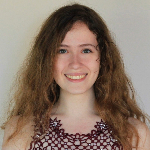 Naomi Bashkansky is entering her Junior year at Harvard, where she studies Computer Science. Naomi helps run the Harvard AI Safety Team. She is interested in reducing existential risk from future AI systems. Toward this end, she is exploring mechanistic interpretability; previously, Naomi interpreted Leela Zero as a REMIX Research Resident. This summer, she is a Quantitative Researcher at Jane Street. Naomi is also a chess Woman International Master and former World Chess Champion for Girls U13.
Naomi Bashkansky is entering her Junior year at Harvard, where she studies Computer Science. Naomi helps run the Harvard AI Safety Team. She is interested in reducing existential risk from future AI systems. Toward this end, she is exploring mechanistic interpretability; previously, Naomi interpreted Leela Zero as a REMIX Research Resident. This summer, she is a Quantitative Researcher at Jane Street. Naomi is also a chess Woman International Master and former World Chess Champion for Girls U13.
 Rahul Bhambri is a Senior Director at Pfizer Inc. part of the Rare Disease US Medical Affairs team. He received his PharmD degree from the Arnold & Marie Schwartz College of Pharmacy at Long Island University in 2009 and completed a pharmaceutical industry fellowship at the Philadelphia College of Pharmacy in 2010. In 2019, Rahul went on to receive his MBA in Pharmaceutical Management from Rutgers Business School. He is currently pursuing his MPH in Epidemiology degree at the T.H. Chan School of Public Health at Harvard University. He is a seasoned medical professional with over a decade of experience in the pharmaceutical industry. Rahul started his career in Medical Affairs at Pfizer Inc. in 2010 as an Associate and has moved on to roles of increasing responsibilities across the Internal Medicine, Cardiovascular, Neurology, and Acute Pain therapeutic areas serving as US and Global Medical Director. He has contributed to over 30 publications and shared research findings through abstract and poster presentations at both national and international scientific conferences. In his current role, he serves as Senior Medical Director at Pfizer part of the US Medical Affairs Rare Disease Leadership Team. He is responsible for leading the development and execution of medical strategies focused on Digital Health, Medicines, and AI solutions in support of rare disease patients. He enjoys working alongside talented colleagues motivated towards the single unifying purpose of bringing about breakthroughs that change patients’ lives. Rahul is a registered pharmacist in the state of New Jersey and enjoys spending time with his family.
Rahul Bhambri is a Senior Director at Pfizer Inc. part of the Rare Disease US Medical Affairs team. He received his PharmD degree from the Arnold & Marie Schwartz College of Pharmacy at Long Island University in 2009 and completed a pharmaceutical industry fellowship at the Philadelphia College of Pharmacy in 2010. In 2019, Rahul went on to receive his MBA in Pharmaceutical Management from Rutgers Business School. He is currently pursuing his MPH in Epidemiology degree at the T.H. Chan School of Public Health at Harvard University. He is a seasoned medical professional with over a decade of experience in the pharmaceutical industry. Rahul started his career in Medical Affairs at Pfizer Inc. in 2010 as an Associate and has moved on to roles of increasing responsibilities across the Internal Medicine, Cardiovascular, Neurology, and Acute Pain therapeutic areas serving as US and Global Medical Director. He has contributed to over 30 publications and shared research findings through abstract and poster presentations at both national and international scientific conferences. In his current role, he serves as Senior Medical Director at Pfizer part of the US Medical Affairs Rare Disease Leadership Team. He is responsible for leading the development and execution of medical strategies focused on Digital Health, Medicines, and AI solutions in support of rare disease patients. He enjoys working alongside talented colleagues motivated towards the single unifying purpose of bringing about breakthroughs that change patients’ lives. Rahul is a registered pharmacist in the state of New Jersey and enjoys spending time with his family.
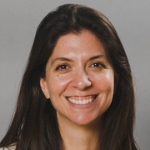 Christine D’Auria is the Assistant Director of the Learning Lab at The Derek Bok Center For Teaching and Learning. Christine collaborates with students, faculty, and the Learning Lab team to develop multimodal projects that have applications in a range of courses and departments across the Colleges and Harvard Griffin Graduate School of Arts and Sciences. She works closely with the Learning Lab’s Media & Design Fellows (MDFs), supporting and documenting MDF projects. These MDF projects creatively integrate a broad range of media, tools, and forms to augment Harvard curricula and faculty research. Christine received her MA in Literary and Cultural Studies from Carnegie Mellon University and holds a PhD in American Studies from Boston University. When not at the Learning Lab, Christine can be found watching movies.
Christine D’Auria is the Assistant Director of the Learning Lab at The Derek Bok Center For Teaching and Learning. Christine collaborates with students, faculty, and the Learning Lab team to develop multimodal projects that have applications in a range of courses and departments across the Colleges and Harvard Griffin Graduate School of Arts and Sciences. She works closely with the Learning Lab’s Media & Design Fellows (MDFs), supporting and documenting MDF projects. These MDF projects creatively integrate a broad range of media, tools, and forms to augment Harvard curricula and faculty research. Christine received her MA in Literary and Cultural Studies from Carnegie Mellon University and holds a PhD in American Studies from Boston University. When not at the Learning Lab, Christine can be found watching movies.
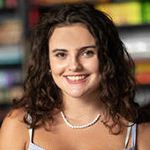 Anna Ivanov (she/her/hers) is a Media and Design Fellow for the Department of Slavic Languages and Literatures, where she is a G6. Anna is passionate about Russian literature, contemporary poetry, teaching, the digital humanities, and combining these interests when possible. She is currently working on a dissertation that explores Russian poetic circles using network theory.
Anna Ivanov (she/her/hers) is a Media and Design Fellow for the Department of Slavic Languages and Literatures, where she is a G6. Anna is passionate about Russian literature, contemporary poetry, teaching, the digital humanities, and combining these interests when possible. She is currently working on a dissertation that explores Russian poetic circles using network theory.
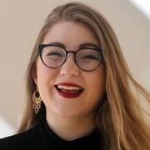 Siriana Lundgren is a PhD student in musicology, meaning she studies music-making in 19th century vice districts, and on off-days, TikTok. Siriana loves thinking about how to make musical and academic ideas digitally accessible for everyone, especially people in rural communities. In a previous life, Siriana worked in a public library and as an opera singer.
Siriana Lundgren is a PhD student in musicology, meaning she studies music-making in 19th century vice districts, and on off-days, TikTok. Siriana loves thinking about how to make musical and academic ideas digitally accessible for everyone, especially people in rural communities. In a previous life, Siriana worked in a public library and as an opera singer.
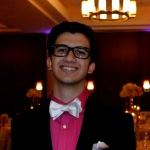 Yusuf Mahmood is a second-year student at Harvard Law School, where he focuses on AI policy and governance to reduce catastrophic risks. He is currently researching legal challenges to potential AI regulatory regimes under the supervision of Professor Matthew Stephenson. Before attending law school, he studied economics and philosophy at the University of Maryland. Today, Yusuf is the Director of Governance Programs at the AI Safety Student Team and he is interested in how emerging technologies like artificial intelligence will transform society in the coming decades.
Yusuf Mahmood is a second-year student at Harvard Law School, where he focuses on AI policy and governance to reduce catastrophic risks. He is currently researching legal challenges to potential AI regulatory regimes under the supervision of Professor Matthew Stephenson. Before attending law school, he studied economics and philosophy at the University of Maryland. Today, Yusuf is the Director of Governance Programs at the AI Safety Student Team and he is interested in how emerging technologies like artificial intelligence will transform society in the coming decades.
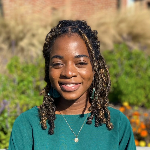 Colombe Obono Eyono (she/her) is a junior in Lowell House from Cameroon, but she has lived in Durban, South Africa her entire life. She studies Applied Mathematics on the Economics track with a secondary in Global Health and Health Policy, but is also really interested in the decolonization and equality,, anthropology, and education access When Colombe is not busy trying to narrow down her academic interests, you can find her reading (both fiction and non-fiction), scrolling through IG reels, or lamenting FC Barcelona’s latest loss. She also prides herself in hosting regular Afrobeats dance parties in her dorm with her roommate. If you stumble upon Colombe on campus, never hesitate to say hi! She is particularly passionate about greeting others and enjoys the thrill of meeting new people.
Colombe Obono Eyono (she/her) is a junior in Lowell House from Cameroon, but she has lived in Durban, South Africa her entire life. She studies Applied Mathematics on the Economics track with a secondary in Global Health and Health Policy, but is also really interested in the decolonization and equality,, anthropology, and education access When Colombe is not busy trying to narrow down her academic interests, you can find her reading (both fiction and non-fiction), scrolling through IG reels, or lamenting FC Barcelona’s latest loss. She also prides herself in hosting regular Afrobeats dance parties in her dorm with her roommate. If you stumble upon Colombe on campus, never hesitate to say hi! She is particularly passionate about greeting others and enjoys the thrill of meeting new people.
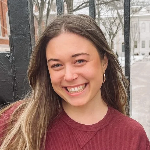 Liz Rowell is an Educational Programs Coordinator at Harvard T.H. Chan School of Public Health. As Educational Programs Coordinator, Liz works to support the MPH programs and meet the needs of students. She received a Masters of Education in Curriculum & Instruction from the Lynch School of Education at Boston College, where she also previously worked to serve underrepresented and first generation college students pursuing medical school. Liz enjoys exploring innovative ways to improve education. She also loves being active, traveling to new places, and is a passionate gluten-free brownie lover.
Liz Rowell is an Educational Programs Coordinator at Harvard T.H. Chan School of Public Health. As Educational Programs Coordinator, Liz works to support the MPH programs and meet the needs of students. She received a Masters of Education in Curriculum & Instruction from the Lynch School of Education at Boston College, where she also previously worked to serve underrepresented and first generation college students pursuing medical school. Liz enjoys exploring innovative ways to improve education. She also loves being active, traveling to new places, and is a passionate gluten-free brownie lover.
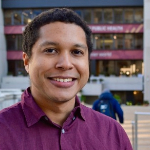 Juan Luis Santana Guerrero has recently completed the Master of Public Health in Epidemiology program at the Harvard T.H Chan School of Public Health this May 2023. Born in Boston and raised in great part in the Dominican Republic (DR), he completed medical school in the DR in 2016 and had been working full-time in the National Health Service of the DR as Coordinator of Analysis and Studies, as well as teach Information Technology and Research Methods courses at O&M Medical School in the DR. Upon graduation from Harvard, he has been providing support to the Office of Diversity and Inclusion at HSPH, as well as work in a research project, which is a collaboration between the Harvard Kennedy School, Arnold Arboretum of Harvard University, and the U.S. Forest Service. In addition, he enjoys learning about computer programming as a hobby and is interested in applying artificial intelligence/machine learning concepts to public health and radiology. He also likes green tea.
Juan Luis Santana Guerrero has recently completed the Master of Public Health in Epidemiology program at the Harvard T.H Chan School of Public Health this May 2023. Born in Boston and raised in great part in the Dominican Republic (DR), he completed medical school in the DR in 2016 and had been working full-time in the National Health Service of the DR as Coordinator of Analysis and Studies, as well as teach Information Technology and Research Methods courses at O&M Medical School in the DR. Upon graduation from Harvard, he has been providing support to the Office of Diversity and Inclusion at HSPH, as well as work in a research project, which is a collaboration between the Harvard Kennedy School, Arnold Arboretum of Harvard University, and the U.S. Forest Service. In addition, he enjoys learning about computer programming as a hobby and is interested in applying artificial intelligence/machine learning concepts to public health and radiology. He also likes green tea.
“Using Lessons from Past Innovations to Preserve the Essence of Education in the AI Era”
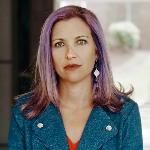 Sarah Newman is Director of Art & Education at metaLAB at Harvard and leads metaLAB’s AI Pedagogy Project. Her work explores the social, ethical, and pedagogical dimensions of artificial intelligence through research, art, and teaching. She is also Co-Founder and Research Lead of the Data Nutrition Project, which addresses bias in data driven systems through tools and educational practices. Newman holds a BA in Philosophy from Washington University in St. Louis and an MFA in Imaging Arts from the Rochester Institute of Technology. She has previously been an AI Grant Fellow, a Harvard Assembly Fellow, a Berkman Klein Fellow, a Rockefeller AI Resident, Artist-in-Residence at Northeastern Law School, and a Grantee of the Notre Dame Tech Ethics Lab and the National Endowment of the Arts. Newman is keen on seashells and naps, and goes by her last name.
Sarah Newman is Director of Art & Education at metaLAB at Harvard and leads metaLAB’s AI Pedagogy Project. Her work explores the social, ethical, and pedagogical dimensions of artificial intelligence through research, art, and teaching. She is also Co-Founder and Research Lead of the Data Nutrition Project, which addresses bias in data driven systems through tools and educational practices. Newman holds a BA in Philosophy from Washington University in St. Louis and an MFA in Imaging Arts from the Rochester Institute of Technology. She has previously been an AI Grant Fellow, a Harvard Assembly Fellow, a Berkman Klein Fellow, a Rockefeller AI Resident, Artist-in-Residence at Northeastern Law School, and a Grantee of the Notre Dame Tech Ethics Lab and the National Endowment of the Arts. Newman is keen on seashells and naps, and goes by her last name.
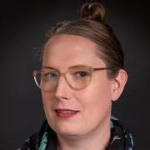 Ellen Popko is an Instructional Technologist at VPAL, where she is helping to develop online course content for the edX platform. Ellen’s background is in open source software development and communities and she seeks to bring the same open ideals to online education. Prior to joining VPAL, Ellen served as the staff technologist for the Berkman Klein Center for Internet and Society at Harvard University where she supported the Center’s mission to explore and understand the internet and digital technology’s impact and influence on society. When not in front of a computer screen Ellen enjoys spending time outdoors in New England and beyond while cycling, backpacking, or snowboarding.
Ellen Popko is an Instructional Technologist at VPAL, where she is helping to develop online course content for the edX platform. Ellen’s background is in open source software development and communities and she seeks to bring the same open ideals to online education. Prior to joining VPAL, Ellen served as the staff technologist for the Berkman Klein Center for Internet and Society at Harvard University where she supported the Center’s mission to explore and understand the internet and digital technology’s impact and influence on society. When not in front of a computer screen Ellen enjoys spending time outdoors in New England and beyond while cycling, backpacking, or snowboarding.
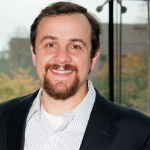 Justin Reich is an educational researcher interested in the future of learning in a networked world. He is the director of the MIT Teaching Systems Lab which aspires to design, implement and research the future of teacher learning. He is the author of Iterate: The Secret to Innovation in Schools (iteratebook.com), coming September 20 from Wiley, and Failure to Disrupt: Why Technology Alone Can’t Transform Education from Harvard University Press. He is the host of the TeachLab podcast, and five open online courses on EdX including Sorting Truth from Fiction: Civic Online Reasoning and Becoming a More Equitable Educator: Mindsets and Practices. Justin is a former fellow and faculty associate of the Berkman Klein Center for Internet and Society at Harvard University.
Justin Reich is an educational researcher interested in the future of learning in a networked world. He is the director of the MIT Teaching Systems Lab which aspires to design, implement and research the future of teacher learning. He is the author of Iterate: The Secret to Innovation in Schools (iteratebook.com), coming September 20 from Wiley, and Failure to Disrupt: Why Technology Alone Can’t Transform Education from Harvard University Press. He is the host of the TeachLab podcast, and five open online courses on EdX including Sorting Truth from Fiction: Civic Online Reasoning and Becoming a More Equitable Educator: Mindsets and Practices. Justin is a former fellow and faculty associate of the Berkman Klein Center for Internet and Society at Harvard University.
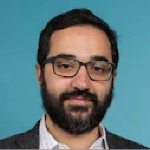 Teddy Svoronos is a Lecturer of Public Policy at the Harvard Kennedy School, where he teaches courses in using statistical methods to improve public policy. His primary interest lies in the use of technology to replicate the dynamics of small classes on a large scale. To this end, Teddy develops fully online courses and blended learning modules that he uses to teach residential students, as well as civil servants abroad. Teddy is the Faculty Director of Harvard’s Evidence for Policy Design Training, a Faculty Lead for the Evidence for Decisions area of HKS’ online Public Leadership Credential, and the Faculty Liaison for Pedagogy and Digital Learning at SLATE. He is also a cofounder of Teachly, a web application focused on creating effective and inclusive learning environments. Teddy received his PhD in Health Policy from Harvard University and his Master’s in Public Health from Columbia University.
Teddy Svoronos is a Lecturer of Public Policy at the Harvard Kennedy School, where he teaches courses in using statistical methods to improve public policy. His primary interest lies in the use of technology to replicate the dynamics of small classes on a large scale. To this end, Teddy develops fully online courses and blended learning modules that he uses to teach residential students, as well as civil servants abroad. Teddy is the Faculty Director of Harvard’s Evidence for Policy Design Training, a Faculty Lead for the Evidence for Decisions area of HKS’ online Public Leadership Credential, and the Faculty Liaison for Pedagogy and Digital Learning at SLATE. He is also a cofounder of Teachly, a web application focused on creating effective and inclusive learning environments. Teddy received his PhD in Health Policy from Harvard University and his Master’s in Public Health from Columbia University.
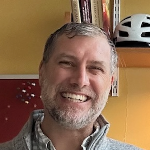 Nick Wilson is the Director of Teaching Innovation for the Harvard Initiative for Teaching and Learning (HILT). Nick provides leadership and vision for the HILT program and teaching and learning activities across Harvard as well as oversight of the HILT team, portfolio of activities, and events. Working across the University by liaising with Deans of Schools, faculty, and academic professional colleagues in the schools, Nick collaborates on the design and implementation of innovative educational programs. A trained learning scientist, Nick earned his Ed.D. and M.Ed. in Learning Technologies from the University of Massachusetts Amherst, and his B.S. in Biomedical Engineering from Duke University. Prior to joining HILT, he held positions at the Stanford University Center for Teaching and Learning, Boston University Center for Teaching and Learning, and Center for Advancing Teaching and Learning through Research at Northeastern University. Nick’s work has appeared in several peer-reviewed journals and edited books, including the Journal of the Learning Sciences, Cognition and Instruction, and Educational Technology Research & Development. He has presented internationally at the International Conference of the Learning Sciences, the annual meeting of the American Educational Research Association, and the International Conference on Computer Supported Collaborative Learning, among other venues.
Nick Wilson is the Director of Teaching Innovation for the Harvard Initiative for Teaching and Learning (HILT). Nick provides leadership and vision for the HILT program and teaching and learning activities across Harvard as well as oversight of the HILT team, portfolio of activities, and events. Working across the University by liaising with Deans of Schools, faculty, and academic professional colleagues in the schools, Nick collaborates on the design and implementation of innovative educational programs. A trained learning scientist, Nick earned his Ed.D. and M.Ed. in Learning Technologies from the University of Massachusetts Amherst, and his B.S. in Biomedical Engineering from Duke University. Prior to joining HILT, he held positions at the Stanford University Center for Teaching and Learning, Boston University Center for Teaching and Learning, and Center for Advancing Teaching and Learning through Research at Northeastern University. Nick’s work has appeared in several peer-reviewed journals and edited books, including the Journal of the Learning Sciences, Cognition and Instruction, and Educational Technology Research & Development. He has presented internationally at the International Conference of the Learning Sciences, the annual meeting of the American Educational Research Association, and the International Conference on Computer Supported Collaborative Learning, among other venues.
Afternoon Plenary: “Next Steps: Developing a Harvard Strategy for AI in Higher Education”
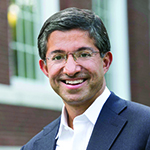 Bharat Anand is Vice Provost for Advances in Learning at Harvard University, and Henry R. Byers Professor of Business Administration at Harvard Business School. He is an expert in digital strategy, corporate strategy, and organizational change. He has published over 50 articles and case studies on these topics, and his work has influenced start-ups and established companies around the globe. His recent book The Content Trap has received acclaim for its perspective on strategy and digital transformation in content industries. He helped oversee the design and creation of Harvard Business School’s digital learning platforms, and created one of its first online courses. Professor Anand is a two time winner of the Faculty Award for Teaching Excellence in the MBA program and a recipient of the Apgar Award for Innovation in Teaching at HBS. He is a recipient of the Greenhill Award for outstanding contributions to Harvard Business School. He received his B.A. in economics from Harvard College magna cum laude, and his PhD in economics from Princeton University.
Bharat Anand is Vice Provost for Advances in Learning at Harvard University, and Henry R. Byers Professor of Business Administration at Harvard Business School. He is an expert in digital strategy, corporate strategy, and organizational change. He has published over 50 articles and case studies on these topics, and his work has influenced start-ups and established companies around the globe. His recent book The Content Trap has received acclaim for its perspective on strategy and digital transformation in content industries. He helped oversee the design and creation of Harvard Business School’s digital learning platforms, and created one of its first online courses. Professor Anand is a two time winner of the Faculty Award for Teaching Excellence in the MBA program and a recipient of the Apgar Award for Innovation in Teaching at HBS. He is a recipient of the Greenhill Award for outstanding contributions to Harvard Business School. He received his B.A. in economics from Harvard College magna cum laude, and his PhD in economics from Princeton University.
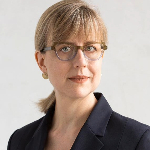 Amanda Claybaugh is the Dean of Undergraduate Education in the Department of English at Harvard. She is also the Samuel Zemurray Jr. and Doris Zemurray Stone Radcliffe Professor of English and Harvard College Professor. Amanda received her BA in English from Yale University in 1993 and her PhD in English from Harvard University in 2001. After teaching at Columbia University for nine years, she returned to Harvard in 2010. Amanda’s scholarship focuses on nineteenth-century literature and history, with a particular attention to the role that teachers and writers play in times of social change. Her first book,The Novel of Purpose: Literature and Social Reform in the Anglo-American World, was awarded the Rudikoff Prize in Victorian studies. Since then, Amanda continued to publish scholarly articles, but she also now writes in more public venues, such as the London Review of Books, Public Books, and n+1. She is currently finishing a work of narrative non-fiction, to be published by Farrar, Straus & Giroux, about the Union occupation of the South Carolina sea islands during the Civil War. Her teaching ranges widely, from Humanities 10 to the Gen Ed course she co-teached on the Civil War, but she finds herself returning, again and again, to the novel. Amanda teaches courses on the 19th century novel, on the 21st century novel, on the historical novel, and on the Bildungsroman.
Amanda Claybaugh is the Dean of Undergraduate Education in the Department of English at Harvard. She is also the Samuel Zemurray Jr. and Doris Zemurray Stone Radcliffe Professor of English and Harvard College Professor. Amanda received her BA in English from Yale University in 1993 and her PhD in English from Harvard University in 2001. After teaching at Columbia University for nine years, she returned to Harvard in 2010. Amanda’s scholarship focuses on nineteenth-century literature and history, with a particular attention to the role that teachers and writers play in times of social change. Her first book,The Novel of Purpose: Literature and Social Reform in the Anglo-American World, was awarded the Rudikoff Prize in Victorian studies. Since then, Amanda continued to publish scholarly articles, but she also now writes in more public venues, such as the London Review of Books, Public Books, and n+1. She is currently finishing a work of narrative non-fiction, to be published by Farrar, Straus & Giroux, about the Union occupation of the South Carolina sea islands during the Civil War. Her teaching ranges widely, from Humanities 10 to the Gen Ed course she co-teached on the Civil War, but she finds herself returning, again and again, to the novel. Amanda teaches courses on the 19th century novel, on the 21st century novel, on the historical novel, and on the Bildungsroman.
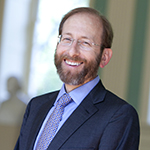
Provost Alan M. Garber serves as Harvard University’s chief academic officer. He is also the Mallinckrodt Professor of Health Care Policy at Harvard Medical School, a Professor of Economics in the Harvard Faculty of Arts and Sciences, Professor of Public Policy in the Harvard Kennedy School of Government, and Professor in the Department of Health Policy and Management in the Harvard T.H. Chan School of Public Health. An economist and physician, he studies methods for improving health care productivity and health care financing. As Provost, Dr. Garber oversees academic activities throughout the university, with direct responsibility for inter-school initiatives, faculty development, research policy, international affairs, and advances in learning. The Harvard Art Museums, the Harvard Library, Harvard University Health Services, HarvardX, the American Repertory Theater, and the Arnold Arboretum are among the organizations reporting to the Provost. Dr. Garber is an Elected Member of the Association of American Physicians, the National Academy of Medicine, and the American Academy of Arts and Sciences. He is also an Elected Fellow of the American Association for the Advancement of Science, the American College of Physicians and the Royal College of Physicians. A summa cum laude graduate of Harvard College, Dr. Garber received a PhD in Economics from Harvard and an MD with research honors from Stanford.
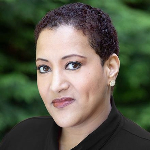 Tsedal Neeley is the Naylor Fitzhugh Professor of Business Administration and Senior Associate Dean of Faculty Development and Research Strategy at the Harvard Business School. Recognized as one of the 100 people transforming business who are innovating, sparking trends, and tackling global challenges by Business Insider, her work focuses on how leaders can scale their organizations by developing and implementing global and digital strategies. She regularly advises top leaders who are embarking on virtual work and large scale-change that involves global expansion, digital transformation, and becoming more agile. Her book, Remote Work Revolution: Succeeding from Anywhere (2021, Harper Collins Business), provides remote workers and leaders with the best practices necessary to perform at the highest levels in their organizations. Her award-winning book, The Language of Global Success: How a Common Tongue Transforms Multinational Organizations chronicles the behind-the-scenes globalization process of a company over the course of five years. She has also published extensively in leading scholarly and practitioner-oriented outlets such as Academy of Management Journal, Organization Science, Management Science, Journal of International Business, Strategic Management Journal and Harvard Business Review, and her work has been widely covered in media outlets such as BBC, CNN, Financial Times, NPR, the Wall Street Journal, and the Economist.
Tsedal Neeley is the Naylor Fitzhugh Professor of Business Administration and Senior Associate Dean of Faculty Development and Research Strategy at the Harvard Business School. Recognized as one of the 100 people transforming business who are innovating, sparking trends, and tackling global challenges by Business Insider, her work focuses on how leaders can scale their organizations by developing and implementing global and digital strategies. She regularly advises top leaders who are embarking on virtual work and large scale-change that involves global expansion, digital transformation, and becoming more agile. Her book, Remote Work Revolution: Succeeding from Anywhere (2021, Harper Collins Business), provides remote workers and leaders with the best practices necessary to perform at the highest levels in their organizations. Her award-winning book, The Language of Global Success: How a Common Tongue Transforms Multinational Organizations chronicles the behind-the-scenes globalization process of a company over the course of five years. She has also published extensively in leading scholarly and practitioner-oriented outlets such as Academy of Management Journal, Organization Science, Management Science, Journal of International Business, Strategic Management Journal and Harvard Business Review, and her work has been widely covered in media outlets such as BBC, CNN, Financial Times, NPR, the Wall Street Journal, and the Economist.

